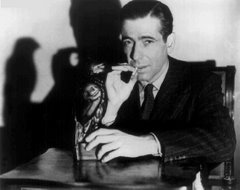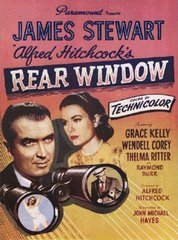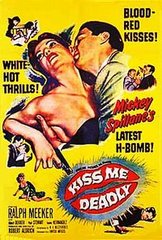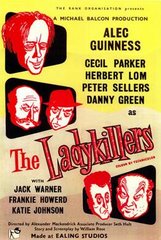
Yes, practically the first image of the film, I know. But at nine years old Fantasia is a little tough to take in a movie theater setting: you can't stop the movie for a lunch break or to run around outside for a few hours, you just have to sit there in the darkened cavern and try not to fall asleep. That silhouetted image of Stokowski was pretty powerful though; it stayed with me and not just because it was the first scene of the movie. There's something elemental about that shot, something basic. Who is he conducting? Who is he? The silhouette, the glowing blue background, it's almost like he's a phantom, a shade, calling forth images from some netherworld. I don't think it's an accident that the film includes sequences like the Sorcerer's Apprentice, or the Rite of Spring in which the conductor seems to be bringing the very world into existence, from a blue nothingness to a world teeming with life and dinosaurs. Watching the movie today, I still get a little thrill from seeing the conductor raise his shadowed arms. This is one of the reasons I wanted to do a childhood movie series, to re-experience those thrills, to remember what it was like to watch movies as a child and to see if the movies might still work their same magic, even now, some ten or fifteen years later.
I've seen Fantasia since that day seventeen years ago. In fact, I remember getting the VHS tape out on many a lazy summer vacation day just to watch the Night On Bald Mountain sequence over and over again. And I do remember watching the Sorcerer's Apprentice section of the film in the theater, as well as the funny hippos and alligators do their Dance of the Hours ballet, and of course, A Night On Bald Mountain. I think the part that put me to sleep in the theater was the Rite of Spring section; Stravinsky's Rite of Spring is not exactly a kid-friendly piece of music (I think it's tough even for adults to get through). And I'm sure I slept straight on through the Pastoral Symphony and was only awakened by the peppiness of Ponchielli. At least, that's how I remember it. Funny, even as a kid, the most kid-friendly section -- The Sorcerer's Apprentice -- was probably my least favorite part. For some reason, it seemed so contained, so ordinary compared to the wild worlds of stuff like the nature ballet of the Nutcracker Suite or the phantasms of A Night On Bald Mountain. Mickey Mouse and inanimate objects coming to life? That seemed as ordinary to me as a Saturday morning cartoon.
Watching the movie again now, I can't say my opinion has changed about The Sorcerer's Apprentice -- still my least favorite section. Which is funny, since apparently, that section always seems to get the most praise from both critics and casual viewers alike. Though I do love this shot:
 That's pretty frightening: an army of brooms, marching in lock-step, uncontrollable, single-minded in their mission of aquatic destruction. I feel like I'm watching a Leni Riefenstahl film by way of Fleischer Studios. Also somewhat scary? This guy:
That's pretty frightening: an army of brooms, marching in lock-step, uncontrollable, single-minded in their mission of aquatic destruction. I feel like I'm watching a Leni Riefenstahl film by way of Fleischer Studios. Also somewhat scary? This guy: According to the animators interviewed on the DVD re-release documentary, this cocked-eyebrow face was modeled after a face Walt Disney himself often made. I once dreamed of being a Disney animator, but I wouldn't have wanted to see that creepy eyebrow pop up whenever Uncle Walt was displeased with my work.
According to the animators interviewed on the DVD re-release documentary, this cocked-eyebrow face was modeled after a face Walt Disney himself often made. I once dreamed of being a Disney animator, but I wouldn't have wanted to see that creepy eyebrow pop up whenever Uncle Walt was displeased with my work.Even though the Sorcerer's Apprentice wasn't and isn't my favorite part of the movie, I did spend a lot of time copying Mickey's image from it. Like I said, I wanted to be to be a Disney animator when I was between the ages of seven and eleven. I spent hours copying this image:
 I think I remember it so clearly because it was one of the first things I drew free-hand that people thought I had traced. Nope! All done free-hand, no tracing for me! At nine years old, I was so proud.
I think I remember it so clearly because it was one of the first things I drew free-hand that people thought I had traced. Nope! All done free-hand, no tracing for me! At nine years old, I was so proud.Watching the film again a few weeks ago, I was, frankly, kinda blown away by it. As a child, certain sections were powerful and made an indelible mark (see: Night On Bald Mountain), but the film as a whole wasn't something I remember wanting to watch, the way one would want to pop in Lady and the Tramp or Back to the Future or Goonies. Watching the film now, I'm struck by, yes, certain sections (see: Night On Bald Mountain), but also by the film as a complete film. Each section could be watched individually, each separate short film existing independently of the others. But I think the sum of the film is actually greater than the parts. Or, to put it another way, I think each individual part comments on and enhances the enjoyment and understanding of all the other parts. The film starts out with Bach's Toccata and Fugue in D Minor, the "abstract" piece of music ("music for its own sake" as the film describes it) that is accompanied by meshes of color and squiggly lines and generally abstract animation, but notice this image towards the end of the piece:

In this piece, "pure" music with no story or dominant idea contained within the music itself, and the Disney animators happen to stick a sunrise/sunset into the thing. Later on the sun will show up as a destroyer of the dinosaurs in the Rite of Spring section:

After Zeus's thunderstorm in the Pastoral Symphony:

And then finally, the last shot of the film, after the nightmares and spectres of Bald Mountain have gone back to their shadows, the pilgrims make their journey through the forest with lighted lamps (metaphors for the sun?) as Schubert's Ave Maria weaves its way into the soundtrack, and they walk into a cathedral made of trees, which open up to reveal the rising sun in all its glory. The music builds, the light grows stronger, and at last, a sunrise, an eternal symbol of hope and the film ends:



And gosh, don't those hills look a little bit like those weird rolling hills from the first section, the Bach Toccata and Fugue?:

The sun imagery is just one repeating theme throughout the film, and I think nature imagery as a whole is the dominant visual theme of the movie. Nature as living thing, maybe even magical (Nutcracker Suite); nature as volatile force, creator and destroyer (Rite of Spring); nature as divine (Pastoral Symphony); nature as healer, giver of hope (Ave Maria). There is also the theme of creative forces, which I mentioned earlier, of creating new life, as represented in the Rite of Spring section and the Sorcerer's Apprentice section. Even in the Toccata and Fugue abstract section, there's a sense that the music itself is somehow willing these images into existence. And the section least thematically tied to the others -- the Dance of the Hours comedy -- still has in the background the changing times of the day: the brightness of midday, the pallor of dusk, the haunted dark of night (which, of course, happens right before the Night On Bald Mountain sequence -- again, each section builds on and comments on the others).
I watched the movie twice in two days when I rented it recently -- a response I was not expecting, frankly. And then I watched it in pieces again for a third time, and each time I watched it I noticed something new, or I caught a new connection, or a new theme. I even noticed things that I've seen echoed elsewhere in other films. This image, for instance:

looks almost identical to the last image of Peter Jackson's The Two Towers (minus the nazgul and fell beasts, of course), where the camera pans up and reveals a hellish shot of Mordor, looking like something out of Dante's Inferno (or now, as I see, out of Disney's Fantasia).
I mentioned the word "elemental" earlier, in reference to the silhouetted conductor's image, and I think that word sums up the experience pretty well. It's animation and cinema on that pure level, on the level of just moving images, as if one is seeing color and line and form all explode for the first time. The emotions and themes of the piece are basic as well:
Fear:

Life:

Death:

Beauty:

Joy:

Evil:

I have to say, I was exhilarated after watching the film recently. I know Pauline Kael called it kitsch, but, if it is, it's the most dazzling, ambitious, and thrilling kitsch I've seen in a long time. There's a sense, after watching it, that one's just witnessed the birth of some new kind of life.

















































